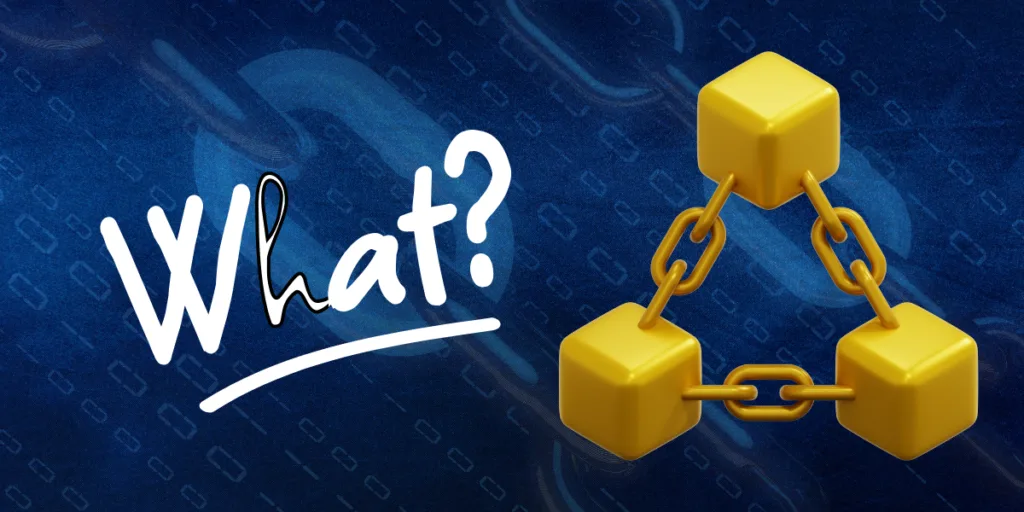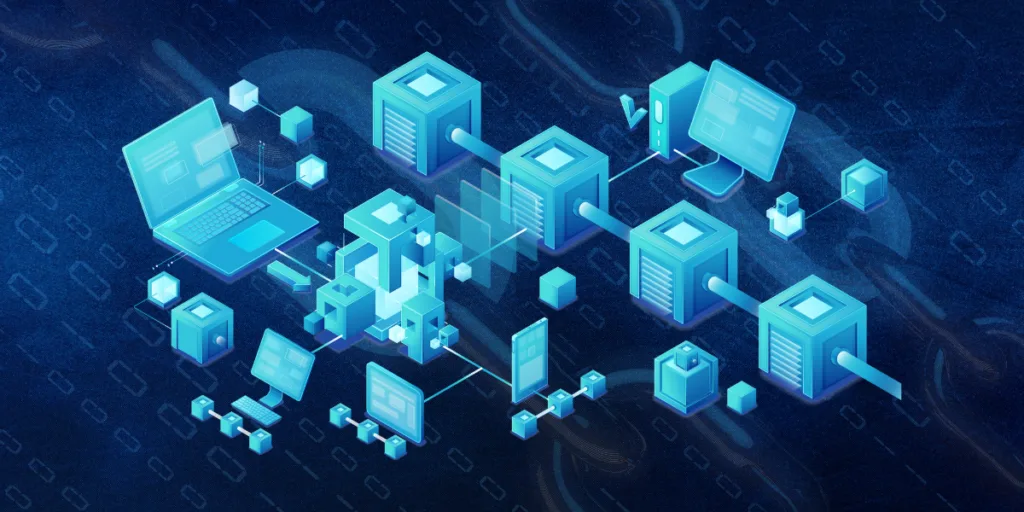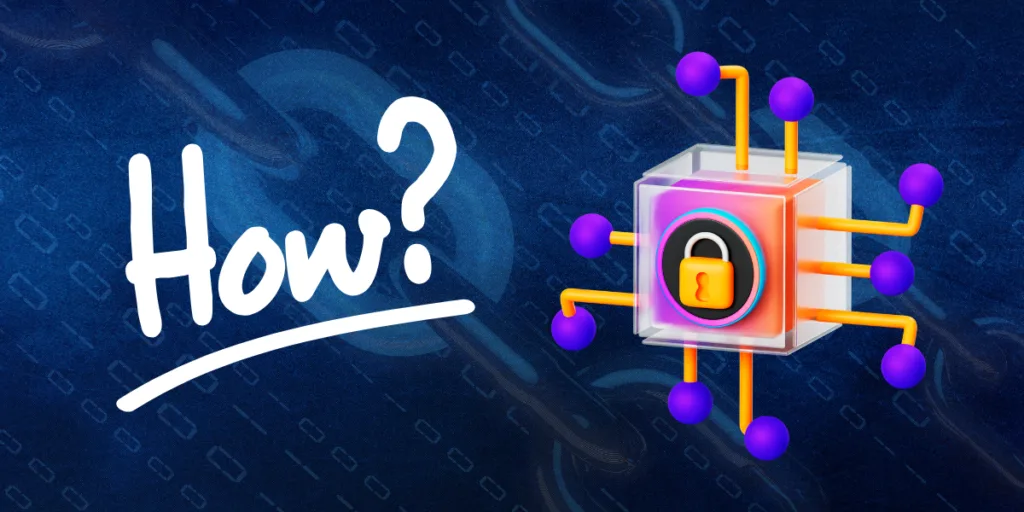
Blockchain in Cybersecurity has become a pivotal force in securing digital infrastructures. As data protection becomes critical for organizations globally, blockchain’s decentralized nature presents a solution to protect against cyber threats.
Introduction
In today’s digital world, protecting sensitive information has become more important than ever. Advanced cyber attacks pose new threats as individuals and organizations look for ways to protect their data. This is where blockchain technology comes in as a potential solution. It not only manages the exchange of cryptocurrency but also helps governments keep data more secure. With its complete decentralization, transparency, and immutability, blockchain appears to be a better ally in protecting data and privacy than existing methods ( Blockchain in Cybersecurity ).
Blockchains operate through immutable distributed ledgers. All information is entered into this ledger. The process of linking each block of data to the next block using strong cryptography creates a solid chain. Thus, while the security features of blockchain have the potential to revolutionize the field of cybersecurity, they also provide ways to protect personal data, authenticate digital identities, and fend off cyberattacks.
This article will explore how blockchain can transform the cybersecurity business, prevent cyber threats, and be the future of secure digital transactions. We will explore how blockchain plays a role in data security and privacy protection. This will help this technology reveal some of its revolutionary benefits in the cybersecurity industry ( Blockchain in Cybersecurity ).
What is Blockchain

Blockchain technology is revolutionary in the way its advanced concepts change our perceptions of data storage, data security, and trust in the ever-changing digital world. Fundamentally, blockchain refers to a public and decentralized digital ledger that records transactions and data on several sites of the computer network, thus ensuring that no single authority controls the information contained in this ledger. Instead of storing data in one single central place, it is distributed over several nodes that are setting participants in the working of the blockchain network. The very nature of this decentralized architecture makes it robust against tempering, fraud, and even cyberattacks ( Blockchain in Cybersecurity ).
Information in a blockchain is stored in blocks. Each block consists of a list of transactions or an entry of data. When filled, it is attached to the previous block, thus creating a chain of blocks, hence the name blockchain. Securing the link among these blocks is done with the help of cryptography, which protects the data such that once it enters the chain, it could never be modified or erased ( Blockchain in Cybersecurity ).
The main difference between a blockchain and conventional databases is their immutability and transparency. Due to the very nature of blockchain, once a transaction or data is recorded, it is almost impossible to change unless all the subsequent blocks are changed with the consensus of the majority of the network. Therefore, blockchain is seen as a highly secure and reliable method to store and protect this information, with far-reaching applications outside of cryptocurrency to include sectors such as finance, healthcare, supply chains, and others.
Blockchain’s Role in Securing Data and Protecting Privacy

This exercise is coming to an end, and blockchain technology is becoming another data security by providing decentralized and immutable systems forever. In these systems, data is managed by a single sovereign authority. However, unlike its predecessors, blockchain already provides decentralized control between each node in the network. This makes it practically impossible for even a hacker to change or retrieve the data ( Blockchain in Cybersecurity ).
Once recorded on the blockchain, the data becomes immutable. This is because changing any data requires changing the entire chain; this change requires the consensus of all nodes across the network. Any attempt by any person to infiltrate this data is practically impossible. The information stored on the blockchain is protected using very strong cryptography, thus allowing any transaction to take place securely. Automated contracts are smart contracts on the blockchain. They perform operations without human intervention, thus reducing the chances of fraud. Furthermore, being decentralized, the data cannot be accessed without authorization. This is a much higher level of security than that provided by central systems ( Blockchain in Cybersecurity ).
Thus, it reduces identity fraud by giving individuals control over their data and limiting theft or malicious use. Therefore, blockchain as a whole works to provide a secure, robust, and private framework to protect data and privacy in today’s digital world.
How Blockchain Prevents Cyber Threats and Strengthens Security

Blockchain in Cybersecurity, Blockchain technology is capable of serving as an excellent shield against attacks on the internet. Its decentralized, cryptographic nature brings with it mechanisms to guard data from its misuse without authorization. Here are some ways in which blockchain can prevent cyber threats and safeguard security in several applications
Decentralization reduces single points of failure
Blockchain in Cybersecurity, Traditional applications store some data in centralized servers or databases. These can be easily attacked by any potential attacker. A single intrusion can expose an entire organization’s network. On the other hand, blockchains operate on distributed ledger systems. In which data is stored across a network of multiple nodes. Such decentralization significantly reduces the risk of a single point of failure. This makes it much more difficult for hackers to compromise such a system. To change any data in the blockchain, an attacker would have to compromise more than 50% of the network nodes. This is almost impossible in the case of large blockchains ( Blockchain in Cybersecurity ).
Immutable records protect the integrity of data
Blockchain in Cybersecurity, One of the most fundamental principles of blockchain is immutability. Once data is added to the blockchain, it cannot be changed or deleted without network consensus. This is why blockchain is ideal for securely recording transactions, files, and any other type of data that needs to be kept intact. This is possible because the immutable nature of the blockchain provides an irrefutable audit trail for fraudulent activity or unauthorized access. This allows for precise verification and significantly reduces the chances of tampering and manipulation ( Blockchain in Cybersecurity ).
Cryptography through enhanced authentication
Blockchain in Cybersecurity, The core of blockchain is advanced cryptography. It ensures that transactions and data are secure. Each block with a specific number contains the cryptographic hash of the previous block. Thus, they are linked together in the chain. This ensures that if the data in a block is changed, the entire chain becomes invalid. Therefore, it protects its entire system from cyber attacks and vulnerabilities. Also, due to the use of public and private key encryption, authentication in blockchain is secure. Only people with the right authority can access or change specific data ( Blockchain in Cybersecurity ).
Transparent and traceable transactions
Since blockchain is open to full transparency and the length and breadth of each transaction, it is clear that every transaction in the blockchain can be publicly recorded and audited by anyone at any time. Thus, complete visibility is available into the data flow related to an event. Such public visibility helps in immediately identifying suspicious activities such as unauthorized or fraudulent transactions. Companies can establish such systems to build customer trust. They will be assured that their data is secure and traceable ( Blockchain in Cybersecurity ).
Exploring the Benefits of Blockchain for Cybersecurity

Blockchain in Cybersecurity, Blockchain is not just a catchy phrase; it is a real fundamental change in cybersecurity practice. In the face of increasing and increasingly sophisticated data breaches and cyberattacks, blockchain will soon offer solutions that have not been addressed by traditional methods. Here’s how it will make a difference:
Unbreakable data integrity
In cybersecurity, ensuring that trusted data has not been altered or compromised is often a major challenge. With blockchain, this situation is avoided because not all transactions or pieces of data can be changed: each one gets its immutable record. Thus, whatever enters the blockchain, is maintained there permanently: it can never be changed without leaving a trace. Therefore, integrity provides a value that is rare in traditional types of databases ( Blockchain in Cybersecurity ).
Decentralization – goodbye to single points of failure
Blockchain in Cybersecurity, Most systems store their data in one place. If hackers get in, they have everything. With blockchain, the data is distributed across multiple computers, making it difficult to hack. There are no single-node attacks. Furthermore, even if the first node is attacked, the other nodes are still secure, protecting the integrity of the entire system.
Minimizing Data Breaches
Older methods rely on centralized storage of sensitive data that is vulnerable to cybercriminals. On the other hand, in a blockchain system, all of an individual’s data is secure. Each record is encrypted with a unique cryptographic key. This makes it virtually impossible for an unauthorized person to access it ( Blockchain in Cybersecurity ).
Improved User Privacy
Blockchain can give individuals back control over their personal information. With features like zero-knowledge proofs, a user can prove their identity or confirm certain facts without revealing any sensitive data. This can be a huge boon for industries like healthcare where privacy is paramount.
The Future of Secure Digital Transactions

Such a world is possible, wherein sending money, buying property, or securing one’s personal data would not require middlemen like banks and large corporations. And that’s precisely what blockchain technology is doing for us and just getting started. This is in line with the definition of decentralization; that is eliminating a central authority for transactional management. Indeed, it will be a direct transaction involving individuals, hence, cutting the cost of speed, process required, and human error or manipulation ( Blockchain in Cybersecurity ).
The security of blockchain lies in how it stores information because any transaction is recorded in a block, and when it becomes a part of the chain, changes or deletions cannot happen. Cryptography protects it, so even if someone tried to alter it, the entire network would instantaneously pick that up and reject it ( Blockchain in Cybersecurity ).
Hence, blockchain is perfect for digital transactions. Whether it’s money transfer, signing a contract, or verifying identity, blockchain provides a level of security and trust practically impossible to replicate with traditional systems. And the best part? This
evolution of technology will guarantee that future digital transactions will be faster, safer, and more transparent-and trust will be built right within the technology.
Why Blockchain is a Game Changer for Data Protection in 2025

As 2025 approaches, data security is becoming a more important issue due to the numerous cyber threats, privacy concerns, and the dense news about data breaches day by day. Therefore, more robust and reliable solutions are needed to enter the world of blockchain. What this technology does here is that it changes the way businesses operate and the entire concept of data security ( Blockchain in Cybersecurity ).
They move and protect communications through secure, open, and immutable channels. Imagine not having a mechanism for every lock that secures your transaction or prevents you from sharing sensitive data. That’s exactly how blockchain works. Instead of storing data in a centralized system that can be hacked and breached, blockchain shares data across a vast network of computers. This makes it much harder to break through its cracks. Then the control of personal data is increasingly put back in the hands of the users. Once a traditional system releases data to the public, it cuts off all possible avenues for exerting control over the data. Instead, blockchain puts ownership in the hands of the users. They can control their data through private keys. This makes it a highly personal-security proposition ( Blockchain in Cybersecurity ).
As 2025 approaches, there is a huge opportunity for data security due to the characteristics of blockchain. Blockchain technology is currently being adopted to secure financial transactions, digital identity, and health records. In its early stages, this emerging technology can be expected to be a key pillar for data security purposes in a few years, leading to a more secure digital future.
Conclusion
More than just a buzzword; blockchain is at the heart of future innovations in cybersecurity and data protection. It eliminates the weaknesses of traditional systems by decentralizing data storage and using cryptographic methods; thus, it provides unprecedented security. As we have seen, blockchain is one of the best operational improvements that can help protect against cyber threats by ensuring the integrity of data, preventing unauthorized access, and providing a transparent environment that cannot be tampered with ( Blockchain in Cybersecurity ).
From securing digital transactions to protecting personal data, blockchain has been a catalyst for change across industries. Whether it is a topic such as ensuring the security of financial systems, health records, or personal identities, its impact cannot be overstated. As the future unfolds to 2025 and beyond, this technology will increasingly be extended to many new innovations to secure these critical sectors in the digital world. With that change, organizations and individuals are increasingly adopting blockchain for its security features. We will see a shift in the way we view data security. Trust can be built into the system through blockchain technology. But it is a miracle that those considerations for safety and security are actually coded into the very nature of the technology that provides blockchain trust. In an interconnected world, blockchain will become a solid defense against the coming wave of cyber threats. And will play its part in making the digital world greener and safer for its people, now and in the future ( Blockchain in Cybersecurity ).
FAQ
1. What are the enabling factors of blockchain technology security compared to traditional systems?
Blockchain security deploys decentralization and cryptography. In a centralized system with one single point of failure, everything gets compromised. The data on the blockchain is distributed across a network of computers, making it more secure. Each transaction is also cryptographically linked to the one before it, thus making tampering with past records almost impossible ( Blockchain in Cybersecurity ).
2. How far does blockchain have user privacy covered?
Advanced encryption methods are used for privacy by blockchain users. With public and private keys, users are in control of their personal information. It allows a zero-knowledge proof allowing a user to prove something about herself without revealing sensitive information about herself; thus giving one more layer of privacy ( Blockchain in Cybersecurity ).
3. Will all cyber threats be thwarted by blockchain?
Although blockchain does throw much protection against many classes of cyber threats, it is not a panacea for all risk types. The main advantage of blockchain technology is that it disallows tampering, fraud, and data breaches, whereas other attributes of blockchain, such as transparency and immutability, decrease such risks.
4. What is the use of blockchain in digital payments?
In digital payments, the blockchain is used to record every transaction securely and immutably in a ledger. This obviates the need for intermediaries, like banks, thus rendering the whole process faster, cheaper, and safer.
5. Is blockchain the future of data security?
Indeed! In response to concerns about data protection, blockchain will emerge as a far greater force giving an immutable, decentralised, and transparent way of handling sensitive data. With its growth, it will be fused into varying industries in order to provide greater security.